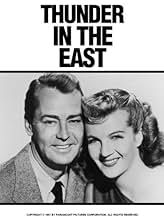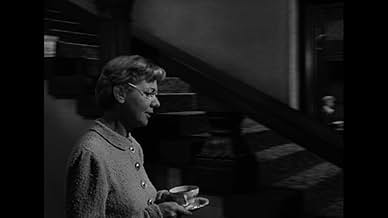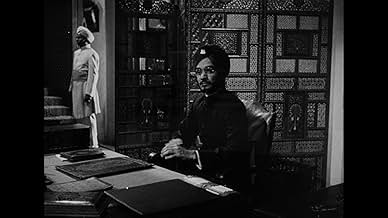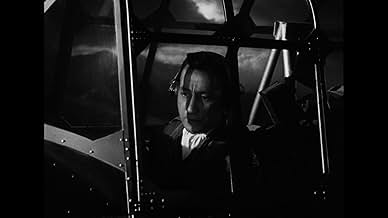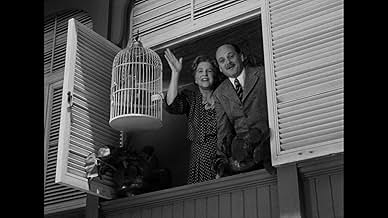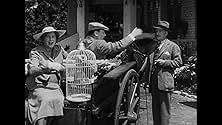IMDb RATING
6.3/10
479
YOUR RATING
In a remote region of post-independence India, the love of a blind British woman pricks the conscience of an arms dealer.In a remote region of post-independence India, the love of a blind British woman pricks the conscience of an arms dealer.In a remote region of post-independence India, the love of a blind British woman pricks the conscience of an arms dealer.
Marc Cavell
- Moti Lal
- (as Mark Cavell)
Charles Lung
- Maharajah
- (as Charlie Lung)
Frank Baker
- Englishman
- (uncredited)
Mohinder Bedi
- Palace Servant
- (uncredited)
Orlando Beltran
- Bus Driver
- (uncredited)
Bobker Ben Ali
- Azam Habibbudin
- (uncredited)
Benita Booth
- Englishwoman
- (uncredited)
Margaret Brewster
- Mrs. Corbett
- (uncredited)
Featured reviews
This film would have been more believable had it been set in Arizona or a similar location, where the "Foreign Leigion" is the US Cavalry, with Anthony Quinn the sergeant , the naughty natives were the Apaches ... and somehow a contrived "Lost City" was stumbled upon somewhere west of Tuscon !!
But "clean" , dry-skinned French cavalry stumbling over a "lost" city in Algeria (with Indian dances and a Maharaja !) and scantily-clad , beautifully-groomed liberal ladies must have raised a few eyebrows even in 1953 !
Still , I hope someone (s) made a small living out of this wasted effort in time and money.
But "clean" , dry-skinned French cavalry stumbling over a "lost" city in Algeria (with Indian dances and a Maharaja !) and scantily-clad , beautifully-groomed liberal ladies must have raised a few eyebrows even in 1953 !
Still , I hope someone (s) made a small living out of this wasted effort in time and money.
Simply a daft film... a very silly film. Ludicrous casting and script though the historical setting and subject matter has real possibilities. The ending was so ridiculously predictable. Alan Ladd playing a sort of B movie gun runner, Charles Boyer playing an Indian... the interest in this film being just how amusingly silly it was.
I liked "Thunder in the East," a 1952 release for this film, made in 1949.
This film looks to have been made on a smallish budget and takes place in the first years of India's freedom from Britain. A man named Steve Gibbs (Alan Ladd) flies in a plane filled with armaments in the Ghandahar province in order to sell them. However, the Prime Minister, Singh (Charles Boyer) wants to achieve a peaceful resolution with the leader of the guerrillas, Khan.
The British living in India are delusional, not realizing that the guerrillas are about to attack. The ones who do get out end up dead en route. Gibbs meets Joan Willoughby (Deborah Kerr) and her parson father (Cecil Kellaway) and manages to meet the maharajah, who defers to the Prime Minister and then leaves the country for the winter.
Gibbs offers his plane, but he gouges the people wanting to leave, which angers Joan, who was falling for him. Now she turns against him and no one will give into what they call blackmail. They gather at the palace, waiting for the guerrillas to attack, and hope that the Prime Minister will let them use the guns he has.
There are a couple of problems with this film. One is the casting of Charles Boyer and his French accent and heavy makeup. I have to say, he was wonderful. He was an underrated actor, but miscast.
The script has a few clichés, particularly the hard core businessman falling for a sweet, altruistic woman. Nevertheless, it certainly held my interest.
I read some complaints about the ending, which for me was the best part of the film. Very dramatic and very exciting. As far as the Prime Minister's beliefs, he was a human being and acted on an injustice viscerally. His idealism went out the window, and that's okay. That's what happens sometimes.
Alan Ladd did a good job in a Bogart-type role. I never considered him much of an actor, but that monotone type of line reading works fine in this type of part, as it did in his film noirs. Deborah Kerr was lovely as a good woman who prides herself on her independence and fearful of losing it.
The film was probably trying to make the point that Gandhi was an idiot, and that following his principles wasn't a good idea. Not sure I'd conclude that in all cases. Maybe in this one.
This film looks to have been made on a smallish budget and takes place in the first years of India's freedom from Britain. A man named Steve Gibbs (Alan Ladd) flies in a plane filled with armaments in the Ghandahar province in order to sell them. However, the Prime Minister, Singh (Charles Boyer) wants to achieve a peaceful resolution with the leader of the guerrillas, Khan.
The British living in India are delusional, not realizing that the guerrillas are about to attack. The ones who do get out end up dead en route. Gibbs meets Joan Willoughby (Deborah Kerr) and her parson father (Cecil Kellaway) and manages to meet the maharajah, who defers to the Prime Minister and then leaves the country for the winter.
Gibbs offers his plane, but he gouges the people wanting to leave, which angers Joan, who was falling for him. Now she turns against him and no one will give into what they call blackmail. They gather at the palace, waiting for the guerrillas to attack, and hope that the Prime Minister will let them use the guns he has.
There are a couple of problems with this film. One is the casting of Charles Boyer and his French accent and heavy makeup. I have to say, he was wonderful. He was an underrated actor, but miscast.
The script has a few clichés, particularly the hard core businessman falling for a sweet, altruistic woman. Nevertheless, it certainly held my interest.
I read some complaints about the ending, which for me was the best part of the film. Very dramatic and very exciting. As far as the Prime Minister's beliefs, he was a human being and acted on an injustice viscerally. His idealism went out the window, and that's okay. That's what happens sometimes.
Alan Ladd did a good job in a Bogart-type role. I never considered him much of an actor, but that monotone type of line reading works fine in this type of part, as it did in his film noirs. Deborah Kerr was lovely as a good woman who prides herself on her independence and fearful of losing it.
The film was probably trying to make the point that Gandhi was an idiot, and that following his principles wasn't a good idea. Not sure I'd conclude that in all cases. Maybe in this one.
Paramount must have had some trepidations about Thunder in the East as it was made in 1949 and held up in release for three years. Nat King Cole recorded the theme from Thunder in the East, a song called The Ruby and the Pearl three years earlier. It's quite a beautiful ballad and perfectly suited for Cole's voice, it's the best thing to come out of this routine action film.
Alan Ladd plays an arms dealer selling weaponry for the best price he can exact from the various sides in the Indian Civil War where the boundaries of India and Pakistan were settled in a lot of blood spilled. He's in Ghandahar province which has its rebel Moslem faction. He falls for Deborah Kerr the blind daughter of missionary Cecil Kellaway.
Ladd's got a silly playboy maharajah in Charles Lung to deal with and a prime minister for Ghandahar who is a disciple of Gandhi's non-violence philosophy. Charles Boyer as the prime minister doesn't want the weapons, but the rebel Moslems want them if for no other reason than to keep them out of Hindu hands and if they can't buy them, they'll take them by whatever means necessary.
The film tries to be a critique of Gandhi's non-violence code, but it doesn't rise above being an action/adventure story. The ending is a rather abrupt one and unconvincing. Still fans of the star players will probably like it.
Alan Ladd plays an arms dealer selling weaponry for the best price he can exact from the various sides in the Indian Civil War where the boundaries of India and Pakistan were settled in a lot of blood spilled. He's in Ghandahar province which has its rebel Moslem faction. He falls for Deborah Kerr the blind daughter of missionary Cecil Kellaway.
Ladd's got a silly playboy maharajah in Charles Lung to deal with and a prime minister for Ghandahar who is a disciple of Gandhi's non-violence philosophy. Charles Boyer as the prime minister doesn't want the weapons, but the rebel Moslems want them if for no other reason than to keep them out of Hindu hands and if they can't buy them, they'll take them by whatever means necessary.
The film tries to be a critique of Gandhi's non-violence code, but it doesn't rise above being an action/adventure story. The ending is a rather abrupt one and unconvincing. Still fans of the star players will probably like it.
Thunder in the East is set in 1947 India ,immediately after being granted independence by Britain ,and in particular events are centred on the state of Ghandahar which is being menaced by brigands,well armed and with a political agenda. The Maharajah of the state is a dilettante playboy ,and his main adviser,played by a blacked up Charles Boyer,is a pacifist who will not countenance using force to resist the incursions of the brigands. Thus when arms entrepreneur Alan Ladd seeks to sell him guns and munitions to resist the enemies of the state he refuses and impounds the cargo.Ladd's existence is further complicated by his falling in love with Deborah Kerr,a blind British woman .who is caught up in the fate of the British community which is particularly under threat from the rebels. Things build to a final siege of the main hotel where the British dig in to resist Performances are okay although white actors blacked up now seems embarrassing ,and there is a touch of Casablanca about the storyline -cynical hero falling in love with an idealistic woman;contending political forces and a smarmy villain.Its nowhere near as good since script and cast are inferior .
Not bad but too stolid to be exceptional.
Not bad but too stolid to be exceptional.
Did you know
- TriviaFilm debut of Jill St. John.
- ConnectionsReferenced in O Espectador que o Cinema Esqueceu (1991)
- How long is Thunder in the East?Powered by Alexa
Details
Box office
- Gross US & Canada
- $2,000,000
- Runtime
- 1h 37m(97 min)
- Color
- Aspect ratio
- 1.37 : 1
Contribute to this page
Suggest an edit or add missing content

